Strictly Personal
West is complicit in current global immigration crisis, By Tee Ngugi
Published
4 months agoon
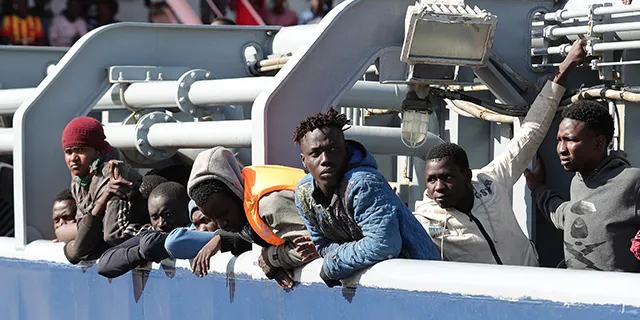
It’s not just African immigrants who are desperate to escape poverty and violence. Thousands of people from Latin and Central America are also fleeing their impoverished and crime-infested countries.
For each of these groups of people, reaching their destination involves unimaginable risks. The Africans trek through the Sahara to get to the Libyan coast. Many of these will end up as skeletons in the sands of the unforgiving desert. Some of those who reach the Libyan coast will end up in watery graves in the Mediterranean Sea.
For the Latin Americans, their odyssey, while not as deadly, is no walk in the park either. Some are kidnapped and tortured by drug cartels to extort money from them or their families. Women are raped and killed. Those who reach the American border face years in detention centres while their asylum application is processed.
These deadly journeys have increased exponentially in the past couple of years, creating an immigration crisis for America and Europe.
Their solution is foolhardy, hypocritical and, in the end, futile. They tighten immigration laws, increase immigration police patrols, they ramp up deportations.
Some build walls, others bribe bordering countries like Mexico and Libya to keep the immigrants there.
All these will not stop desperate people from seeking better lives. They will find ways of circumventing those tough laws. They will scale the walls.
They will breach the security cordons of countries trying to hold them back. They will break out of detention centres. Someone who has trekked through the Sahara or survived drug cartels develops unique psychological and physical strengths. In any case, all these non-solutions only make human trafficking, with its inherent dehumanising aspects, a very lucrative business.
The solution, therefore, lies elsewhere. In eliminating the conditions that cause illegal immigration. This means helping those countries to strengthen governance institutions and the rule of law, stopping the pillaging of countries by their leaders in cahoots with Western profiteers, and finding an international system of holding the thieving political class in these countries to account.
The hypocrisy and self-righteousness of the West in this matter is just astounding. How do you roll out the red carpet for a fellow like Yahya Jammeh, as Barack Obama did, thereby legitimising and strengthening his despotism, then complain when thousands of impoverished Gambians come knocking on your door?
Of course, these Western leaders know the likes of Teodoro Obiang and his clones across Africa will not develop their countries, but they will not say so because they hold Africa to a different standard.
When Greece was mismanaging its economy, its leaders would be given a tough talking to before being given financial or other support. The West expected and demanded much better from Greece.
When it comes to African and Central American leaders, it’s platitudes about development and democracy. Back at home, the endorsement by Washington or London legitimises plunder. Plunder equals poverty, violence, and immigration.
Tee Ngugi is a Nairobi-based political commentator
You may like
-
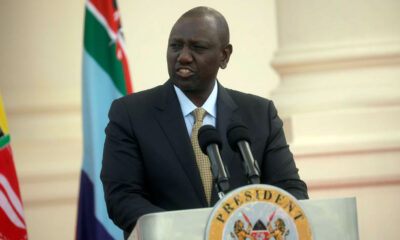

Kenya: President Ruto hints at ‘dire’ weather outlook as Cyclone Hidaya nears
-


Kenyan footballer arrested over brutal robbery, murder case
-


Kenya: President Ruto assured of fresh IMF disbursement
-


RepAir, Cella partner to launch carbon capture in Kenya
-


IMF predicts Kenya’s economy to overtake Angola
-


Kenya’s Peres Jepchirchir fulfils promise of breaking world record at London Marathon
Strictly Personal
This Sudan war is too senseless; time we ended it, By Tee Ngugi
Published
7 days agoon
April 28, 2024
Why are the Sudanese Armed Forces (SAF) and the paramilitary Rapid Support Forces (RPF) engaged in a vicious struggle? It is not that they have ideological, religious or cultural differences.
Not that people should fight because of these kinds of differences, but we live in a world where social constructions often lead to war and genocide. It is not that either side is fighting to protect democracy. Both sides were instruments of the rapacious dictatorship of Omar el-Bashir, who was overthrown in 2019.
Both are linked to the massacres in Darfur during Bashir’s rule that led to his indictment by the International Criminal Court for crimes against humanity. They both stood by as ordinary, unarmed people took to the streets and forced the removal of the Bashir regime.
None of these entities now fighting to the last Sudanese citizen has any moral authority or constitutional legitimacy to claim power. They both should have been disbanded or fundamentally reformed after the ouster of Bashir.
The SAF and the RSF are fighting to take over power and resources and continue the repression and plunder of the regime they had supported for so long. And, as you can see from news broadcasts, they are both well-versed in violence and plunder.
Since the fighting began in 2023, both sides have been accused of massacres that have left more than 30,000 people dead. Their fighting has displaced close to 10 million people. Their scramble for power has created Sudan’s worst hunger crisis in decades. Millions of refugees have fled into Chad, Ethiopia and South Sudan.
The three countries are dubious places of refuge. Chad is a poor country because of misrule. It also experiences jihadist violence. Ethiopia is still simmering with tensions after a deadly inter-ethnic war.
And South Sudan has never recovered from a deadly ethnic competition for power and resources. African refugees fleeing to countries from which refugees recently fled or continue to flee sums up Africa’s unending crisis of governance.
Africa will continue to suffer these kinds of power struggles, state failure and breakdown of constitutional order until we take strengthening and depersonalising our institutions as a life and death issue. These institutions anchor constitutional order and democratic process.
Strong independent institutions would ensure the continuity of the constitutional order after the president leaves office. As it is, presidents systematically weaken institutions by putting sycophants and incompetent morons in charge. Thus when he leaves office by way of death, ouster or retirement, there is institutional collapse leading to chaos, power struggles and violence. The African Union pretends crises such as the one in Sudan are unfortunate abnormally. However, they are systemic and predictable. Corrupt dictatorships end in chaos and violence.
Tee Ngugi is a Nairobi-based political commentator.
Strictly Personal
Air Peace, capitalism and national interest, By Dakuku Peterside
Published
3 weeks agoon
April 16, 2024
Nigerian corporate influence and that of the West continue to collide. The rationale is straightforward: whereas corporate activity in Europe and America is part of their larger local and foreign policy engagement, privately owned enterprises in Nigeria or commercial interests are not part of Nigeria’s foreign policy ecosystem, neither is there a strong culture of government support for privately owned enterprises’ expansion locally and internationally.
The relationship between Nigerian businesses and foreign policy is important to the national interest. When backing domestic Nigerian companies to compete on a worldwide scale, the government should see it as a lever to drive foreign policy, and national strategic interest, promote trade, enhance national security considerations, and minimize distortion in the domestic market as the foreign airlines were doing, boost GDP, create employment opportunities, and optimize corporate returns for the firms.
Admitted nations do not always interfere directly in their companies’ business and commercial dealings, and there are always exceptions. I can cite two areas of exception: military sales by companies because of their strategic implications and are, therefore, part of foreign and diplomatic policy and processes. The second is where the products or routes of a company have implications for foreign policy. Air Peace falls into the second category in the Lagos – London route.
Two events demonstrate an emerging trend that, if not checked, will disincentivize Nigerian firms from competing in the global marketplace. There are other notable examples, but I am using these two examples because they are very recent and ongoing, and they are typological representations of the need for Nigerian government backing and support for local companies that are playing in a very competitive international market dominated by big foreign companies whose governments are using all forms of foreign policies and diplomacy to support and sustain.
The first is Air Peace. It is the only Nigerian-owned aviation company playing globally and checkmating the dominance of foreign airlines. The most recent advance is the commencement of flights on the Lagos – London route. In Nigeria, foreign airlines are well-established and accustomed to a lack of rivalry, yet a free-market economy depends on the existence of competition. Nigeria has significantly larger airline profits per passenger than other comparable African nations. Insufficient competition has resulted in high ticket costs and poor service quality. It is precisely this jinx that Air Peace is attempting to break.
On March 30, 2024, Air Peace reciprocated the lopsided Bilateral Air Service Agreement, BASA, between Nigeria and the United Kingdom when the local airline began direct flight operations from Lagos to Gatwick Airport in London. This elicited several reactions from foreign airlines backed by their various sovereigns because of their strategic interest. A critical response is the commencement of a price war. Before the Air Peace entry, the price of international flight tickets on the Lagos-London route had soared to as much as N3.5 million for the economy ticket. However, after Air Peace introduced a return economy class ticket priced at N1.2 million, foreign carriers like British Airways, Virgin Atlantic, and Qatar Airways reduced their fares significantly to remain competitive.
In a price war, there is little the government can do. In an open-market competitive situation such as this, our government must not act in a manner that suggests it is antagonistic to foreign players and competitors. There must be an appearance of a level playing field. However, government owes Air Peace protection against foreign competitors backed by their home governments. This is in the overall interest of the Nigerian consumer of goods and services. Competition history in the airspace works where the Consumer Protection Authority in the host country is active. This is almost absent in Nigeria and it is a reason why foreign airlines have been arbitrary in pricing their tickets. Nigerian consumers are often at the mercy of these foreign firms who lack any vista of patriotism and are more inclined to protect the national interest of their governments and countries.
It would not be too much to expect Nigerian companies playing globally to benefit from the protection of the Nigerian government to limit influence peddling by foreign-owned companies. The success of Air Peace should enable a more competitive and sustainable market, allowing domestic players to grow their network and propel Nigeria to the forefront of international aviation.
The second is Proforce, a Nigerian-owned military hardware manufacturing firm active in Rwanda, Chad, Mali, Ghana, Niger, Burkina Faso, and South Sudan. Despite the growing capacity of Proforce in military hardware manufacturing, Nigeria entered two lopsided arrangements with two UAE firms to supply military equipment worth billions of dollars , respectively. Both deals are backed by the UAE government but executed by UAE firms.
These deals on a more extensive web are not unconnected with UAE’s national strategic interest. In pursuit of its strategic national interest, India is pushing Indian firms to supply military equipment to Nigeria. The Nigerian defence equipment market has seen weaker indigenous competitors driven out due to the combination of local manufacturers’ lack of competitive capacity and government patronage of Asian, European, and US firms in the defence equipment manufacturing sector. This is a misnomer and needs to be corrected.
Not only should our government be the primary customer of this firm if its products meet international standards, but it should also support and protect it from the harsh competitive realities of a challenging but strategic market directly linked to our national military procurement ecosystem. The ability to produce military hardware locally is significant to our defence strategy.
This firm and similar companies playing in this strategic defence area must be considered strategic and have a considerable place in Nigeria’s foreign policy calculations. Protecting Nigeria’s interests is the primary reason for our engagement in global diplomacy. The government must deliberately balance national interest with capacity and competence in military hardware purchases. It will not be too much to ask these foreign firms to partner with local companies so we can embed the technology transfer advantages.
Our government must create an environment that enables our local companies to compete globally and ply their trades in various countries. It should be part of the government’s overall economic, strategic growth agenda to identify areas or sectors in which Nigerian companies have a competitive advantage, especially in the sub-region and across Africa and support the companies in these sectors to advance and grow to dominate in the African region with a view to competing globally. Government support in the form of incentives such as competitive grants ,tax credit for consumers ,low-interest capital, patronage, G2G business, operational support, and diplomatic lobbying, amongst others, will alter the competitive landscape. Governments and key government agencies in the west retain the services of lobbying firms in pursuit of its strategic interest.
Nigerian firms’ competitiveness on a global scale can only be enhanced by the support of the Nigerian government. Foreign policy interests should be a key driver of Nigerian trade agreements. How does the Nigerian government support private companies to grow and compete globally? Is it intentionally mapping out growth areas and creating opportunities for Nigerian firms to maximize their potential? Is the government at the domestic level removing bottlenecks and impediments to private company growth, allowing a level playing field for these companies to compete with international companies?
Why is the government patronising foreign firms against local firms if their products are of similar value? Why are Nigerian consumers left to the hands of international companies in some sectors without the government actively supporting the growth of local firms to compete in those sectors? These questions merit honest answers. Nigerian national interest must be the driving factor for our foreign policies, which must cover the private sector, just as is the case with most developed countries. The new global capitalism is not a product of accident or chance; the government has choreographed and shaped it by using foreign policies to support and protect local firms competing globally. Nigeria must learn to do the same to build a strong economy with more jobs.
EDITOR’S PICK


Kenya: President Ruto hints at ‘dire’ weather outlook as Cyclone Hidaya nears
President William Ruto has announced that the severe rains that have been plaguing Kenya for the past several weeks resulting...


Again, Rwanda denies it attacked displaced persons in DR Congo
For the sixteenth time, Rwanda refuted US charges on Saturday that its troops attacked a camp for internally displaced persons...


Nigeria offers oil majors faster exit if …
Oil-rich West African country, Nigeria, has offered major oil companies, such as Exxon Mobil and Shell, that planned to leave...


Nigeria’s Security Exchange chief to meet foreign, local crypto exchanges, others over crypto regulation
On Monday, local and international cryptocurrency exchanges will meet with Dr. Emomotimi Agama, the recently appointed Director General of the...


Rhino Resources, BP-Eni JV sign agreement for Namibia offshore licence
Rhino Resources Namibia and a BP-Eni joint venture have agreed to share a 42.5% stake in a block located in...
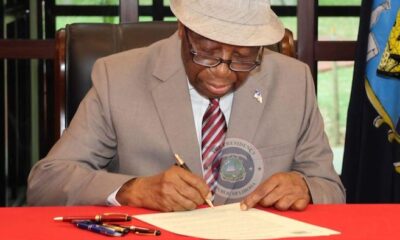

Liberia: President Boakai signs order to create war crimes court
To provide long-overdue justice to those who suffered grave injustices during the two civil wars that raged in Liberia, President...
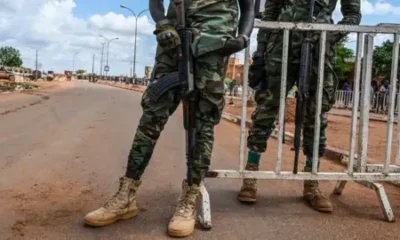

US official accuses Russian troops of entering base housing US military in Niger
According to a senior United States defence official quoted by Reuters, Russian military soldiers have entered an air base in...
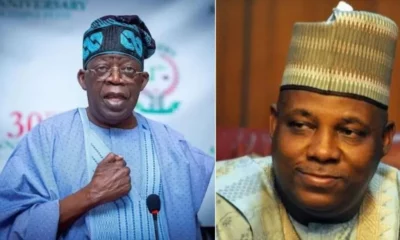

Nigeria’s presidency insists reforms prevented economic collapse
Nigeria’s presidency on Thursday reiterated that the current administration’s economic reforms of the past one year “saved the life of...
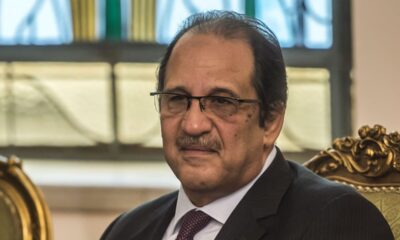

Hamas leader in talks for Gaza ceasefire with Egypt, Qatar
Ismail Haniyeh, the leader of Hamas, spoke with Abbas Kamel, the head of Egypt’s security services, and Mohammed bin Abdulrahman...
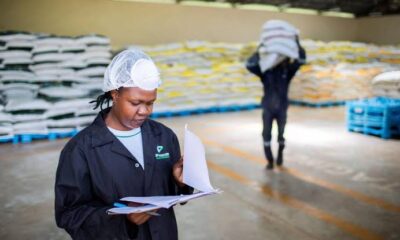

Kenya agri-tech startup iProcure placed under administration over unpaid debts
Kenyan agri-tech startup, iProcure, has been placed under administration due to its inability to clear up undisclosed debts. The advisory...
Trending
-
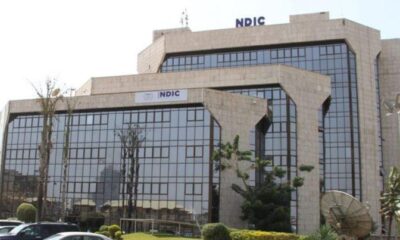
 VenturesNow2 days ago
VenturesNow2 days agoNigeria’s Insurance Corporation raises maximum deposit coverage from N500k to N5m
-

 Sports2 days ago
Sports2 days agoLiverpool legend Graham Souness wants ‘selfish’ Salah to leave club
-
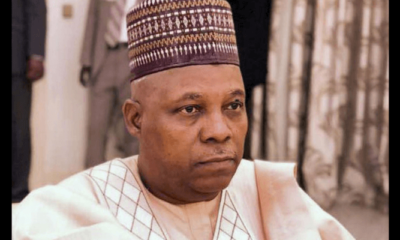
 Metro2 days ago
Metro2 days agoNigeria’s economy will witness positive changes after painful sacrifice— VP Shettima
-

 VenturesNow13 hours ago
VenturesNow13 hours agoNigeria offers oil majors faster exit if …


